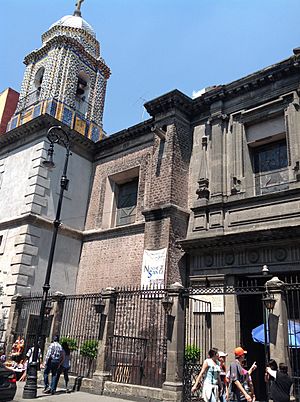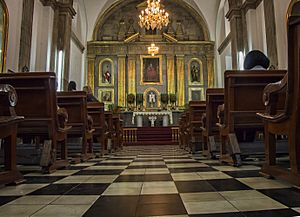Valvanera Cathedral, Mexico City facts for kids
Quick facts for kids Valvanera Cathedral, Mexico City |
|
|---|---|
| Country | Mexico |
| Denomination | Roman Catholic |
The Cathedral of Our Lady of Valvanera is a beautiful church in Mexico City. You can find it in the historic center, southeast of the main plaza called the Zocalo. It sits at the corner of Correo Mayor and República de Uruguay streets.
This church started as part of the Convent of Santo Niño Perdido, which was founded way back in 1573. Later, in the 1600s, it became a convent for a group of nuns called Conceptionists. The church and convent were rebuilt in 1667, and that's when it got its current name.
In 1861, during a time of big changes in Mexico called the Reform War, the nuns had to leave the convent. The parts of the convent connected to the church were taken down. The main altar inside the church was almost ruined during these political struggles. However, a special oil painting of the Black Virgin of Valvanera (sometimes spelled Balvanera) was saved.
Because of its history and beauty, this church was officially named a historic monument on August 30, 1932. Today, it serves as the main church, or cathedral, for the Maronite Catholic Eparchy of Our Lady of the Martyrs of Lebanon in Mexico.
Architecture and Design
The Valvanera Cathedral is built in the Baroque style, which was very popular for churches and grand buildings. Its main entrance is on the side, which was common for convents in Mexico.
Unique Features
The bell tower of the church is covered in special tiles from Puebla, a city famous for its pottery. Only this church and the church of La Encarnación in Mexico City have bell towers decorated with these unique Puebla tiles.
The front of the church, called the facade, is made of a reddish volcanic stone called tezontle. It has five strong supports, called buttresses, that help hold it up. At the top, there's a decorative band called an entablature with a frieze. This frieze has special symbols, called anagrams, for the names of Jesus and Mary. Both of the church's entrances have two levels of detailed decorations.
Inside the Church
Inside, the main altar is made of stone and is in the Neoclassical style, which came after Baroque. The important oil painting of Nuestra Señora de Balvanera dates back to the 1600s. This painting and some sculptures in the church were given by a Maronite church. In the sacristy, which is a room where priests prepare for services, you can see paintings by an artist named Carlos Clemente Lopez from 1750.
See also
 In Spanish: Catedral de Nuestra Señora de Balvanera para niños
In Spanish: Catedral de Nuestra Señora de Balvanera para niños
- List of colonial churches in Mexico City
 | Georgia Louise Harris Brown |
 | Julian Abele |
 | Norma Merrick Sklarek |
 | William Sidney Pittman |



